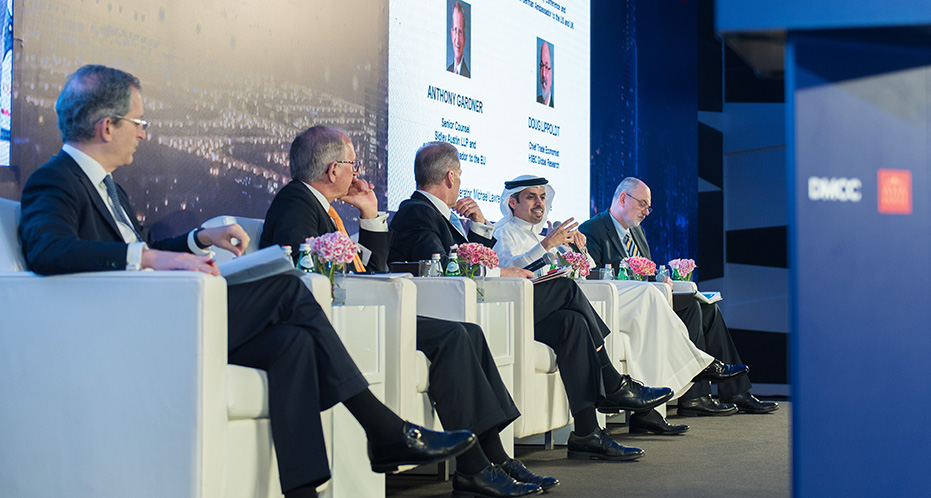Driving commercial and political engagement between Asia, the Middle East and Europe
Driving commercial and political engagement between Asia, the Middle East and Europe
Driving commercial and political engagement between Asia, the Middle East and Europe

Countries must “join forces” to combat US protectionism, while emerging markets must “do more” to address inequities in the global trading system, delegates at Asia House’s conference in Dubai heard during a forthright discussion on the future of trade.
With economic tensions between the US and China dominating the international trade discourse, the options for averting a trade war were high on the agenda at the conference, held in partnership with DMCC.
Leading authorities in trade policy offered analysis and their own unique insights on how the issues currently disrupting the global system could – and should – play out.
America First
President Trump’s ‘America First’ agenda was a key focus, with former US Ambassador to the European Union, Anthony Gardner, labelling current US policy “erratic and counterproductive,” adding that it puts American exporters at a “competitive disadvantage.”
In part, President Trump’s drift towards protectionism – and the US withdrawal from the Trans Pacific Partnership (TPP) in particular – helped accelerate the EU-Japan free trade agreement, Gardner argued, creating less favourable conditions for US companies trading in those markets.
Wolfgang Ischinger, Chairman of the Munich Security Conference and former German Ambassador to the US, analysed the motives behind President Trump’s policy positions, arriving at two possibilities.
“It could all be about tactics,” he said. “The criticism of the existing system in certain areas does make sense. We in the EU would agree with the US that existing arrangements do not adequately constrain Chinese practices, that China should open certain markets more. The EU would also agree with China that some US agricultural practices distort global trade.”
However, the other explanation is that “the US could be targeting the WTO in order to blow it up to make bilateralism the new norm,” Ischinger said.
“Join forces”
In response, “US trade partners should join forces to protect the trading system,” he proposed, adding that markets should work together to create “a WTO minus America, similar to what Japan achieved with the TPP.”
In other words, participants in the global trading system could adopt a ‘business as usual approach’ effectively ignoring US efforts to undermine the current architecture. But how determined are those efforts? Doug Lippoldt, Chief Trade Economist, HSBC Global Research, struck a more optimistic tone, and warned against losing perspective.
“I don’t think it’s too late to have a ‘win win’ outcome at the end of this,” he said. Reflecting on a recent visit to the US in which he spoke with high-level staff on Capitol Hill, he said, “the commitment to the multilateral trade system, that the US has helped build up over several years, runs very deep in Washington.”
Optimism should be seen in the fact that both the US and China have taken their disputes to the WTO – a sign that the system is working, Lippoldt observed.
Emerging markets
In this respect, it is conceivable that trade tensions between Beijing and Washington could yet be resolved. But there is also an important conversation to be had around the underlying causes of those tensions. This was something His Excellency Hamad Baumim, President and CEO, Dubai Chamber of Commerce and Industry, sought to instigate during the panel, which was chaired by Michael Lawrence, Chief Executive of Asia House.
Looking beyond the US-China rivalry, His Excellency took a wider view of the underlying issue that is driving it; the “over-promises” that were made around globalisation.
“There were over-promises about what was expected from globalisation,” he said. “Everybody expected that, with more globalisation and more openness, many developing countries would engage with the global trading system.” But this hasn’t happened across the board, with some emerging economies limiting access to certain sectors.
“People believe strongly that not everybody benefited the same and that a lot of developing countries can do more to contribute,” His Excellency said. He identified the need for these emerging markets to open up their economies to trading partners.
“Going forward, developing countries, especially India and China, need to have more reforms.” For example, “it is much easier for Chinese investors to invest in America than it is for Americans to invest in China,” he said. Positive steps from emerging economies to open up more will appease Western markets, and thus improve trade relations and restore confidence in the global system.
“We see this as important for allowing growth in trade and the continuing increase in globalisation,” His Excellency said, adding that “businesses need to get engaged in the dialogue.”
Dialogue
And that was the key word that emerged from the panel; dialogue. There was a consensus that the current issues in global trade can be overcome through more engagement and discussion. That conclusion will be tested this week, with US-China trade talks taking place in Beijing. All eyes will now be on the outcome of those talks, and a potential deal that could stabilise the global trade order.
Follow the latest developments in the US-China trade talks at Asia House Insights.
The New Global Trade Order conference took place in Dubai as part of the Asia House Middle East Programme. The conference was sponsored by HSBC.
